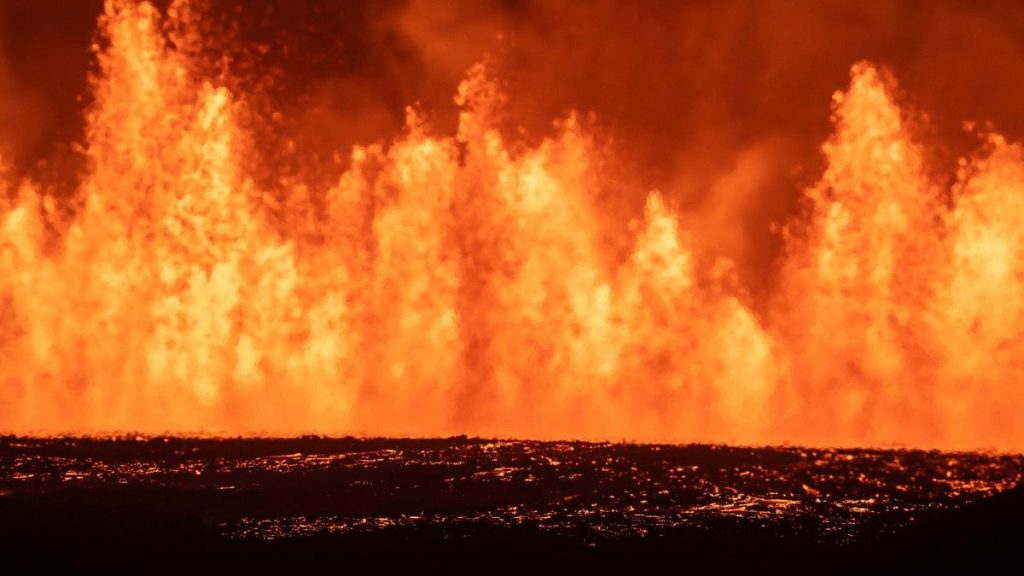Iceland’s Reykjanes Peninsula has witnessed its seventh volcanic eruption since December 2023, marking another chapter in the ongoing saga of seismic activity in the region. This latest eruption, commencing on Wednesday evening, unfolded with minimal warning, featuring a 3-kilometer fissure spewing lava near the renowned Blue Lagoon geothermal spa. While the eruption’s scale is deemed smaller than previous events in August and May, it underscores the persistent volcanic dynamism characterizing this area. The lava flow, initially moving at a rate of 100 meters per hour, has reached the Blue Lagoon’s parking lot, prompting its closure until further assessment. Despite the proximity of the eruption, Keflavik International Airport, Iceland’s primary air travel hub, continues to operate without disruption.
The Icelandic Meteorological Office closely monitors the eruption’s progression, providing regular updates on its characteristics and potential impacts. Observations suggest the activity mirrors earlier patterns, with seismic activity and ground deformation remaining low. The lava flow, having traversed the Grindavíkurvegur road and a hot water pipeline, continues its westward trajectory. This eruption site, part of the Svartsengi volcanic system, reawakened in 2023 after nearly eight centuries of dormancy, neighboring the Fagradalsfjall volcano, which also emerged from a 6,000-year slumber in 2021.
The town of Grindavík, situated approximately 50 kilometers southwest of Reykjavik, has been evacuated as a precautionary measure due to the proximity of the eruption. While the current assessment suggests the fissure’s growth is unlikely, the possibility remains, necessitating the evacuation. The recurring volcanic activity around Grindavík has caused infrastructural damage and property losses, forcing many residents to relocate for safety. This latest eruption follows a series of earthquakes in December that opened large fissures in the earth, triggering an earlier evacuation of Grindavík.
Authorities strongly advise against approaching the eruption site, emphasizing the potential dangers and urging observation from a safe distance. While volcanic eruptions often draw tourists eager to witness the spectacle, officials stress that the Reykjanes eruption is not a tourist attraction, highlighting the importance of prioritizing safety and respecting established restrictions. Despite the eruption’s proximity to Keflavik International Airport, flight operations remain unaffected, with arrivals and departures proceeding as scheduled. The airport, equipped to manage volcanic activity, reassures travelers that it is well-prepared to handle such events without closures. Furthermore, while volcanic ash can pose a threat to aviation, the current eruption hasn’t produced significant ash clouds, minimizing disruption to air travel.
Iceland, known for its volcanic activity with an average eruption every five years, has robust preparedness measures in place. The country’s geoscientists possess extensive experience in managing volcanic events, ensuring effective responses to such occurrences. While the 2010 eruption of Eyjafjallajokull caused widespread air travel disruptions due to a massive ash cloud, current eruptions have not had similar impacts. The unique circumstances of the Eyjafjallajokull eruption, involving a glacier that interacted with the lava to create a vast ash cloud, are not present in the current situation. This, coupled with improved preparedness measures within the European Aviation Safety Agency (EASA), minimizes the risk of widespread air travel disruptions.
Iceland remains a safe destination for travelers despite the current volcanic activity. Authorities recommend avoiding the Grindavík area and adhering to local restrictions. Keflavik International Airport and access roads remain fully operational, and there are no travel warnings issued for Iceland. Airlines and travel companies continue to operate normally, meaning travelers canceling bookings might not be entitled to automatic refunds. Travel insurance policies purchased after the onset of the recent earthquakes and subsequent eruptions might not cover cancellations related to these events. Travelers should consult their policy wording and contact their airline or travel provider for updated information and assistance. The Blue Lagoon, a major tourist attraction, has been temporarily closed due to the eruption, with lava now reaching its parking lot. The situation is under continuous assessment, and updates on its reopening will be provided.









